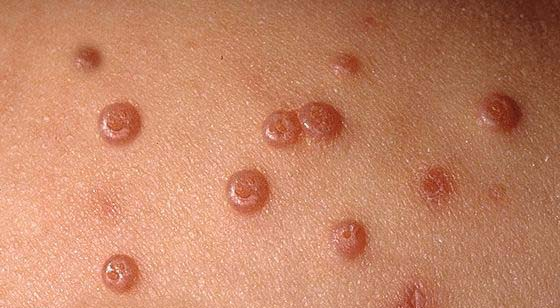Molluscum contagiosum is a viral infection that affects the skin. It is caused by a virus known as the molluscum contagiosum virus (MCV). The infection results in raised, pearl-like bumps on the skin. It is most common in children, but can also affect adults. Molluscum contagiosum is highly contagious and can be spread through direct contact with an infected person or through contact with contaminated objects such as towels, clothing, and toys. It can also be spread through sexual contact. The infection usually resolves on its own without treatment, however treatment may be necessary in some cases to reduce discomfort or prevent the spread of the virus to other areas of the body or to other people. Treatment options include medications, topical treatments, cryotherapy (freezing), laser treatments, and surgical removal.
Diagnosis and Treatment of Molluscum Contagiosum
Molluscum contagiosum is a skin infection caused by the molluscum contagiosum virus (MCV). It is a common skin condition that affects people of all ages. The infection causes small, raised bumps to form on the skin. These bumps are usually painless and non-itchy but can be itchy or sore in some cases. The diagnosis of molluscum contagiosum is usually made based on the appearance of the bumps. A doctor may also take a sample from one of the bumps and examine it under a microscope to confirm the diagnosis.
There are several treatments for molluscum contagiosum, including:
- • Topical creams or ointments
- • Cryotherapy (freezing)
- • Laser therapy
- • Surgery (for large lesions)
- mlb66 ir
It is important to note that these treatments may not completely remove all of the bumps. In some cases, multiple treatments may be necessary to achieve desired results. It is also important to keep in mind that these treatments can be painful and can cause scarring if not done correctly. In addition to treatment, there are measures you can take to help prevent molluscum contagiosum from spreading:
- • Wash your hands often with soap and water, especially after touching affected areas.
- • Avoid sharing towels, clothing, or other items with someone who has molluscum contagiosum.
- • Cover affected areas with clothing or bandages when engaging in physical activity or swimming in public pools or beaches.
- • Keep your skin clean and dry at all times.
By following these steps and seeking appropriate medical treatment if necessary, you can help reduce your risk of getting molluscum contagiosum or spreading it to others.
Treating and Preventing Molluscum Contagiosum: A Guide
Molluscum contagiosum is a skin condition caused by a virus. It is characterized by small, raised bumps on the skin that can range in size from a few millimeters to several centimeters. While it is most common in children, adults can also be affected. Fortunately, there are several home remedies that can be used to treat and prevent molluscum contagiosum.
Home Remedies for Treating Molluscum Contagiosum
One of the most effective home remedies for treating molluscum contagiosum is to keep the affected area clean and dry. Washing with soap and water regularly will help to reduce the spread of the virus and speed up healing. Applying a warm compress or soaking in a warm bath may also help to reduce itching and discomfort.
Another home remedy for treating molluscum contagiosum is to apply over-the-counter creams or ointments such as hydrocortisone or calamine lotion. These products can help to reduce inflammation and itching associated with molluscum contagiosum.
Home Remedies for Preventing Molluscum Contagiosum
The best way to prevent molluscum contagiosum is by practicing good hygiene. This means washing your hands frequently with soap and water, avoiding contact with infected individuals, not sharing personal items such as towels or clothing, and avoiding activities such as swimming in public pools or hot tubs.
It’s also important to cover any open wounds or cuts with a bandage until they heal completely. This will help prevent the virus from entering your body through broken skin.
When to See a Doctor for Molluscum Contagiosum
Molluscum contagiosum is a common skin infection caused by a virus. It is highly contagious and can spread through skin-to-skin contact or contact with an infected person’s clothing, towels, or other personal items. In most cases, molluscum contagiosum will go away on its own without treatment. However, if your symptoms are severe or last more than a few weeks, you should see your doctor. Your doctor may suggest treatments to reduce the number of lesions and help them heal faster.
Treatments include cryotherapy (freezing), laser therapy, curettage (scraping away the lesions), and topical medications such as cantharidin or trichloroacetic acid (TCA). Your doctor may also prescribe antiviral medications such as acyclovir to help reduce the risk of spreading the infection to others. It is important to practice good hygiene and take steps to prevent spreading molluscum contagiosum to others. This includes avoiding sharing clothes, towels, and other personal items with an infected person and washing your hands frequently.
You should also avoid scratching or picking at the lesions as this can cause them to spread further. If you suspect that you have molluscum contagiosum, it is important to speak with your doctor for proper diagnosis and treatment options. Your doctor can also provide advice on how to prevent spreading the infection further.
Conclusion
Molluscum contagiosum is a common viral infection that can be treated and prevented. While it is usually harmless, it can be uncomfortable or embarrassing to live with. If you think you have molluscum contagiosum, contact your doctor for diagnosis and treatment options. Taking simple steps like avoiding close contact with people who have the virus, covering affected areas of skin, and washing your hands often can help prevent the spread of the virus. With proper treatment, molluscum contagiosum should resolve within several weeks or months.




